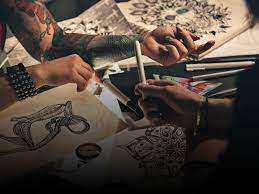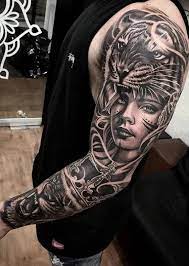
Tattooing is an intricate craft that involves puncturing the skin and drawing blood, making health and safety considerations extremely important. At tattoo artist school, you will learn how to create a clean working environment, properly maintain and clean tattoo machines, and adhere to strict bloodborne pathogen regulations.
Designing Tattoos
Designing Tattoos that look good on the skin is crucial for creating striking designs. Size, location, and detail all affect how quickly a tattoo heals and how it looks over time. It is essential to avoid poorly placed or overly detailed Tattoos that may fade swiftly and respond poorly to touchups. Building a portfolio showcasing your talent and artistic range is also essential, including sketches, drawings, paintings, tattoos, and tattoo designs.
Sanitation
Proper sanitation and hygiene are of utmost importance in tattooing, considering the puncturing and drawing of blood from clients’ skin. Using single-use needles and equipment helps minimize the spread of bloodborne pathogens, while reusable tools must be autoclaved before each use. Wearing gloves, upholstering the tattooing chair with easy-to-clean materials, and avoiding mats and carpeting that could harbor bacteria are crucial sanitation practices. When considering apprenticeships, thorough research is necessary to ensure the hygiene standards of potential studios. Additionally, state regulations often require obtaining proper licensing and certification in bloodborne pathogen safety.
Health and Safety
Tattoo artists need to possess CPR and first aid certification in case of emergencies. Comprehensive first-aid training equips them with skills to assist in cardiac arrests, burns, and cuts. Tattoo artists should also obtain a Bloodborne Pathogens Certification due to their close contact with infectious materials. This training should be received from accredited sources such as training facilities, healthcare facilities, or hospitals.
Business and Marketing
In addition to tattooing techniques, tattooists-to-be must learn business strategies such as marketing, appointment scheduling, and adherence to health and safety guidelines. A robust portfolio showcasing your artistic style and expertise in creating tattoo designs is essential when submitting art to potential mentors. Avoid tattoo schools that charge fees, as they often provide subpar education that could compromise your reputation and client safety. Traditional apprenticeships are the best way to gain experience in the industry.

